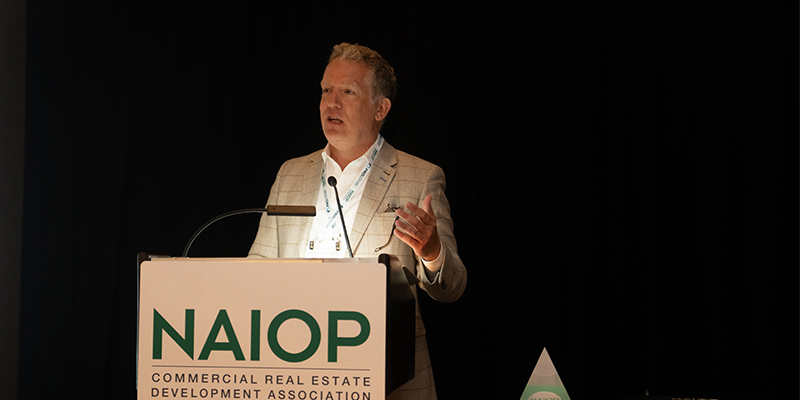“There’s a really exciting trend emerging in hiring and compensation that’s going to accelerate throughout 2023,” opened Chris Lee, CEO of CEL & Associates, during a recent NAIOP webinar. “It’s the blending together of the quantitative – the numbers, compensation and bonuses – and the qualitative – workplace environment and benefits.”
Lee detailed compensation and benefits trends identified in his firm’s annual Compensation and Benefits Report, jointly published in partnership with NAIOP and specializing in commercial real estate firms and positions. In 2022, bonus realization for performance was around 90% of target – quite high, but a key tactic for attracting and retaining talent. Base salary increases in 2023 range from 4-6% overall, and higher for mission-critical positions.
In terms of workplace evolution, he said that 68% of CRE firms now offer telecommuting and 67% have “business casual” days. Benefits-wise, 61% offer wellness programs, 53% of firms are rebidding insurance programs to be more competitive, and 42% extend benefits to part-time employees.
Recruitment data reflects employees’ desire to maintain remote work and flexible policies cultivated during the pandemic. Lee said that 38% of CRE employees have not returned to the office five days per week, and 60% of remote employees say they are extremely likely to change companies if remote flexibility ends.
Real estate firms are adapting their business resource policies to appeal to a younger talent base – a wise move, given than 40% of today’s real estate workforce is age 50+, Lee said. Digitization, automation and artificial intelligence will continue to restructure staffing levels and operations, and off-shoring non-core functions, like accounting or marketing, will accelerate and could result in a 20-30% reduction in these types of positions through 2024.
Lee said that CRE firms are rapidly advancing employee engagement practices to reduce turnover, avoid unnecessary surprises and improve employee satisfaction. The motto “Work with a Purpose” is expected to advance desirable benefits that employees say they want most: mobility, autonomy and optionality that create a company culture that is inviting and frictionless.
Employee Resource Groups (ERGs) – employee-led groups centered on a shared interest or experience, such as groups for military veterans – are expanding, said Lee. Technology has expanded connection points with these groups, even if employees aren’t full-time or in the office on the same days. Firms that are fostering these groups benefit from the culture of core values they create.
Andrew Hunt, Vieth Director for the Center for Real Estate at Marquette University, said that students are increasingly curious about full-time remote work options that would allow them to move around the country while maintaining steady employment. Lee noted that these types of generational expectations are reshaping hiring teams. Once mostly comprising senior-level executives, hiring teams now incorporate younger employees with more similar experiences and presumptions to recent graduates just entering the workforce.
The bottom line, Lee said, is that work, workers and the workplace are being completely redefined and revitalized. As recruiting and retention challenges abound, talent management must become a dynamic core competency of CRE firms.
Ryan Neale, managing director with SelectLeaders, a CRE-focused job network for employers and candidates and a NAIOP partner, discussed industry sectors and how they’re performing with regards to hiring trends. Office is in decline, and niche asset classes including life science and self-storage are increasing. Multifamily had a strong start to 2023, and industrial has remained mostly flat.
Between 2022 and 2023, roles in development, finance and capital markets were down, Neale said, and positions in accounting and asset/portfolio management grew.
Geographically, the Sunbelt markets are outperforming the rest of the nation. Dallas has emerged as a major CRE hiring destination, as well as the North Carolina Research Triangle and Nashville.
Investing in the talent pipeline and strategic hiring plan are key strategies for coming out on top, said Neale as he noted that an estimated 30% of CRE firms do not have a talent acquisition team. “Firms that are going through a lack of growth in 2023 could be left behind if they don’t have their eye on the future for talent,” he said. “We saw this coming out of 2008. The companies that invested then in talent growth and internal growth were stronger coming out of that downturn.”
Companies continue to cite the need for diverse workforces, Hunt said, but change hasn’t been fast. “What’s going to drive DEI more than anything else will be the capital markets,” said Lee, as companies seeking capital must answer how diversity programs are being implemented throughout their organizations. Earlier engagement of future workforces is essential, said Neale, and will organically attract new voices into an industry they may have never considered as a career path.
Employee branding and value proposition are more than just words on a poster, Neale said. Defining your company’s mission, vision and values will help you identify the types of employees you want to attract and retain, as well as enabling you to understand what sets your firm apart from the competition. Employees are placing greater emphasis on working for organizations with strong values that align with their own personal priorities.
The recording from the March 21 2023 Talent Recruitment and Compensation Trends webinar is available at no cost to NAIOP members.








